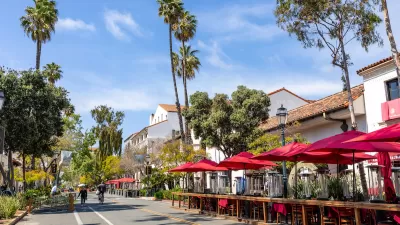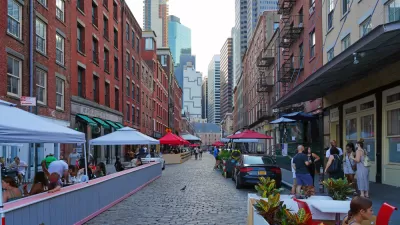Sustainable real estate developer, A-P Hurd asks some fundamental questions about the on-street parking in her Seattle neighborhood and concludes that residents should be able to do more than park cars with the spots in front of their homes.
Hurd writes, "Most of us in single family neighborhoods have a proprietary relationship with the street parking spot in front of their house. We think: "someone is parked in MY spot."
Generally speaking, the street space in front of homes is not owned by the homeowner - but that doesn't deter A-P Hurd, who is also a Runstad Fellow in the College of Built Environments at the University of Washington from exploring possibilities
Living on a narrow street, she asks, "Why is the city in the business of paving and maintaining three lanes of street when only one of them is actually moving cars?" (See her photo of her street in article).
Her next questions stem from the observation that 'curb lanes' are used for nothing but car storage, even when the homes may have driveways and carports or garages.
- "Why should local zoning require on-site parking when hardly any one is using their on-site parking for parking?"
- "The most interesting question: If we think on-site parking has better uses than parking, could we elect to use our street parking for better uses as well?"
- If the resident has "zero, or even one car per household, you're not really allowed to do anything else with that space, so you're losing out relative to your multi-car neighbors." Is that fair?
"Given that people do have this (proprietary) relationship with the parking spot in front of their house, what if we enabled them to do something other than park there? Some compact neighborhoods have taken to putting bike corrals or patios in parking spots..." (photos shown of Mission District parklet, San Francisco and Melrose Market Bike Corral, Seattle).
Hurd doesn't insist on parklets - she suggests 'monetizing' the parking, which is what "The High Price of Free Parking" author, Donald Shoup, defines as a Parking Benefit District. And technology has already jumped on this monetization - there's an 'app' for that.
Bottom line: "There is wasted space in the "parking" lanes of our single family neighborhoods. Let's build some frameworks that open up these spaces to human ingenuity, and see if we can't get more value out of them."
Hurd is also the "author of a recent book of practical strategies to get to better cities and stronger economies using less energy: The Carbon Efficient City."
Thanks to The Atlantic Cities newsletters
FULL STORY: That Parking Spot In Front of Your House Doesn't Belong to You

Planetizen Federal Action Tracker
A weekly monitor of how Trump’s orders and actions are impacting planners and planning in America.

Restaurant Patios Were a Pandemic Win — Why Were They so Hard to Keep?
Social distancing requirements and changes in travel patterns prompted cities to pilot new uses for street and sidewalk space. Then it got complicated.

Map: Where Senate Republicans Want to Sell Your Public Lands
For public land advocates, the Senate Republicans’ proposal to sell millions of acres of public land in the West is “the biggest fight of their careers.”

Maui's Vacation Rental Debate Turns Ugly
Verbal attacks, misinformation campaigns and fistfights plague a high-stakes debate to convert thousands of vacation rentals into long-term housing.

San Francisco Suspends Traffic Calming Amidst Record Deaths
Citing “a challenging fiscal landscape,” the city will cease the program on the heels of 42 traffic deaths, including 24 pedestrians.

California Homeless Arrests, Citations Spike After Ruling
An investigation reveals that anti-homeless actions increased up to 500% after Grants Pass v. Johnson — even in cities claiming no policy change.
Urban Design for Planners 1: Software Tools
This six-course series explores essential urban design concepts using open source software and equips planners with the tools they need to participate fully in the urban design process.
Planning for Universal Design
Learn the tools for implementing Universal Design in planning regulations.
Heyer Gruel & Associates PA
JM Goldson LLC
Custer County Colorado
City of Camden Redevelopment Agency
City of Astoria
Transportation Research & Education Center (TREC) at Portland State University
Camden Redevelopment Agency
City of Claremont
Municipality of Princeton (NJ)





























